ACDC 2006 - Day 3 (3/25): Strategy & Leadership Craft
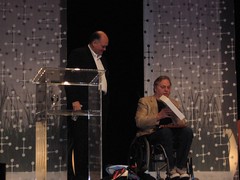
Jim Hackett
- Steelcase CEO
Designing spaces for the group mind
- places that help groups design in a better way
- moving from "I" to "You and I" to "We"
based on Mark Weiser (RIP) work on ubicomp at Xerox PARC
!Design's value to business is "solving complex problems:
- helping to see the complexity of things
!Search engines
- key aspects in looking at role of info at work
- search is prosthetic: makes you 100X more powerful
- extend it from personal to groups
- from PC to GC (general computing), displays need to scale up
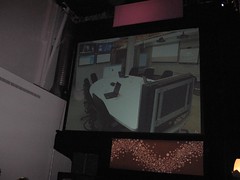
!- information has a seat at the table
!- ambient info
!- put info in the room like you on your desktop
- table allows you to see info from anywhere
- sidespace - for after-mtg discussions (very fruitful)
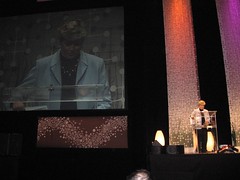
Claudia Kotchka, Top Five Mistakes Learned the Hard Way
- accountant who spent most of her time in marketing
- VP Design Innovation & Strategy, P&G
- building design into P&G's DNA for 5 yrs
History:
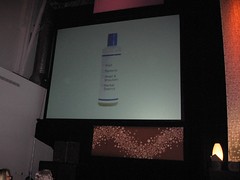
- P&G is technology co.
- big brands run on scale
- mass mktg: started on soap opera, largest TV advertiser in the world
- design used to be last "decoration station" on the way to market
- focus on efficiency
- 2001, CEO says "We need to design experiences"
5 Lessons
1. Designers are different
- "fish are the last to know they're in water"
- designers are visual, deductive and inductive and abductive (imagine the possibilities)
- businesspeople think in words and numbers, deductive and inductive (logic)
!- teach business leaders how designers are different
!- teach designers the language of business
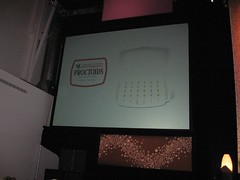
2. Don't try to explain design. Show it.
- Proctoids: Would you pay the same? Would even want it?
- case studies: internal, external
- Kandoo (helps kids potty train themselves): brand based on design, not technology
3. Designers need inspirational workspaces
4. Experienced hires need time to integrate
- culture shock because there was no map
- instituted massive on-boarding program
- set expectations w/ business leaders
!5. This is a culture change
- biggest lesson
- this is not a design problem
- engaging all functions in the practice of design
- design thinking, design for innovation
Jeff Goodby, Storytelling in Three Seconds or Less
- Goodby Silverstein
!- craft = "Letting the painting tell you what to do next", amplification of the process
- 30sec commercial has haiku-like structure
- takes environmentalist view: want people to get the joke, expect them to be smart, have a sense of humor
- New ads have to be seeked out, sent to friends
- New networks will be made of people
- ads need to be beautiful, interesting for a long time
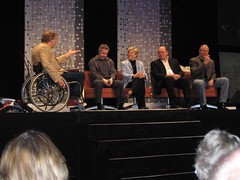
Panel: Tim Brown (IDEO), Kotchka, Hackett, Goodby
- How to make design work in big corporationss?
JH: Lack of design literacy at top of co.s
CK: Craft to implementing design strategy
- Teaching people what design is _in ways they understand_
- how do you show it? Get them to live, experience
- CEO took team to IDEO to immerse in it (it was work, solving problems, not a tour)
- innovating around sustainability
JG: good people find creative ways to work against rational process
- we're seeing beyond the eBay interface to the communities, people
- moving back from mass-produced to craft culture, where users make technology
- emergent experiences: we can't predict where things are going to go
- launch and go on journey w/ users
JH: David Kelley said, "It costs no more to torture plastic ugly than beautiful"
<< Home